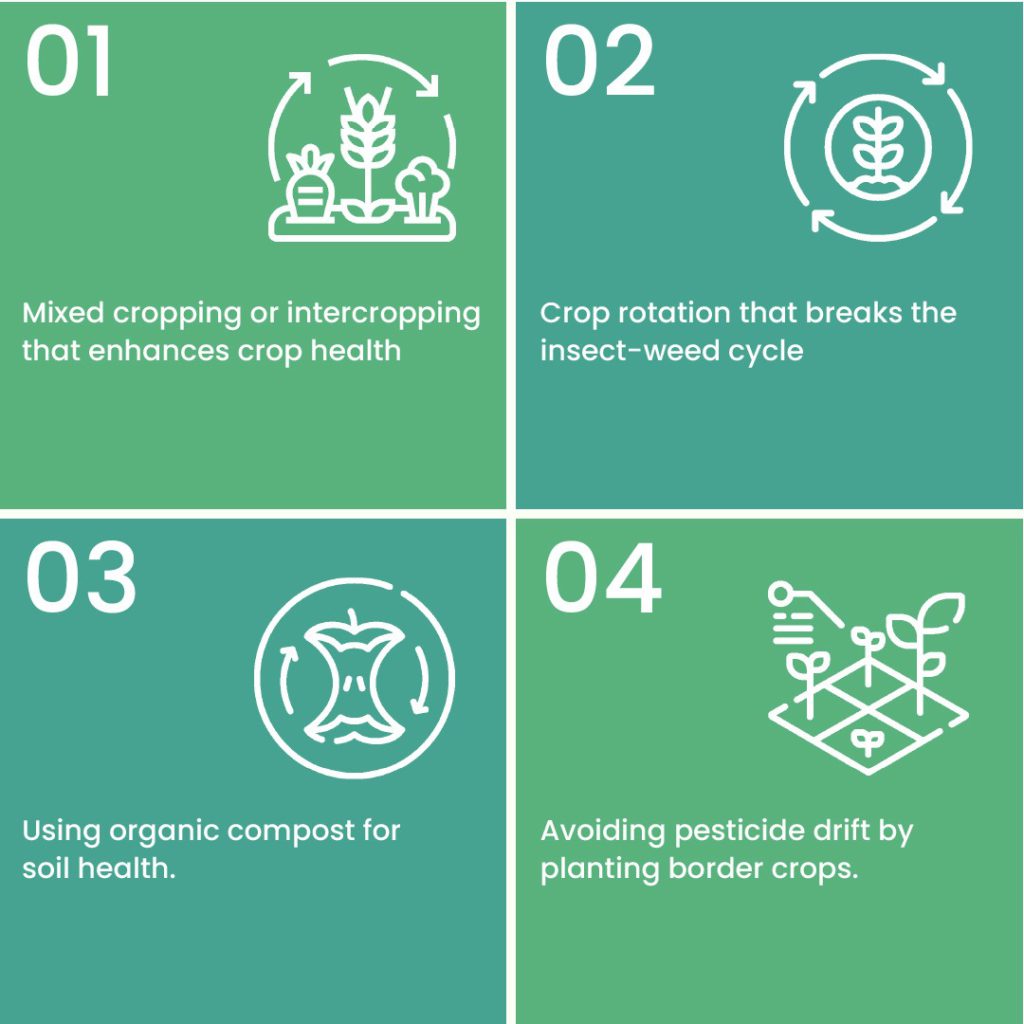Contact: +91 99725 24322 |
Menu
Menu
Quick summary: Discover the power of Non-Pesticidal Management (NPM) for sustainable agriculture. Learn how NPM practices can promote ecological balance, reduce chemical pesticide use, and ensure healthier food production. Explore the benefits of embracing natural alternatives and join the movement towards a more sustainable and environmentally friendly agricultural system.

In our pursuit of sustainable agriculture, finding alternatives to conventional pesticide use is essential. Non-pesticidal management(NPM) offers a promising approach that focuses on ecological and holistic principles to manage pests and diseases. By promoting natural pest control mechanisms, reducing reliance on chemical pesticides and enhancing ecosystem resilience, NPM aims to create a more sustainable and environmentally friendly farming system.
In this blog post , we will explore the concept of non-pesticidal management, its key principles and the benefits it brings to sustainable agriculture. Let us delve into this innovative approach that harmonizes farming practices with nature, fostering a healthier and resilient food system for the future.
The NPM method of agriculture involves various strategies to control pests and maintain the health of the crop. NPM is an agroecological approach to pest management without the use of chemical pesticides. It is financially lucrative for the farmers and also a means of practical and sustainable means of agriculture practice.
Let us highlight the importance of NPM:
Embracing NPM practices not only benefits farmers and consumers but also contributes to a broader goal of building a more sustainable and environmentally friendly food system for future generations.
Integrated pest management can be considered a key strategy for sustainable use of pesticides. The contribution of organic farming to sustainable agriculture will be significant in terms of plant protection. This should also lower the risks to health and environment.
Organic farming provides a natural way of crop cultivation using plant and animal-based organic resources that enhance nutrients in crops. It is a sustainable agricultural approach with a reduction in the use of chemical pesticides that ensures effective yields, food safety, and environmental sustainability.
The aftermath of covid-19 brought a dietary shift among consumers with the majority of them demanding chemical-free food. Certified organic products are expensive, and the smallholder farmers follow the conventional farming practices. The shift from conventional to organic farming is expensive and takes a long time. Non-pesticidal management (NPM) bridges the gap between the two.
Pesticides are toxic to humans and can have chronic health effects on its exposure. Though they are necessary for crop growth by preventing attacks by pests, weeds and insects, their levels need to be under check. The toxicity of pesticides depends on various factors. Insecticides are more toxic than herbicides. The maximum residue limits are normally set to avoid excess of pesticides in food that is detrimental to health.
Pesticides contaminate soil, water, and other vegetation. Pesticides can be toxic to other organisms like fish, birds, and certain beneficial insects. Contamination of water, especially groundwater is widespread. The cleanup is very costly and complex. Overuse of chemical fertilizers and pesticides affects soil health. Pesticide sprays can even cause air pollution. The pesticide drift spreads over a distance of a few yards to hundreds of miles. They are also a threat to the marine world. NPM advocates no use of chemicals and GMOs and promotes the use of low energy and water.
The major economic losses in the USA were due to public health, crop losses, and groundwater contamination. Pesticidal drift causes harm to crops. NPM yields pesticide-free food for people thereby ensuring food safety. Also, the reduced input costs eliminate intermediaries and assure farmers of a fair price.
Huge input costs for chemicals and pesticides are a burden for the smallholder farmers. These farmers get indebted to seed vendors and money lenders and incur economic losses. The introduction of cooperatives and FPOs empowers farmers to take correct decisions and get the necessary market linkage.
Non-pesticidal management is one of the sustainable farming practices that strengthen the natural resilience of crops and practices that address the pest cycles.
This is normally done in two phases. Initially, traps are placed to identify pests. Weeding of crops, placing bird perches, and removing disease-affected plants are done. In the second phase, pest attacks are managed.
Farmers are advised to use bio-pesticides made from local ingredients like ginger, garlic, and neem.
These bio-repellants are more effective than synthetic pesticides as they control and prevent pests. The synthetic ones only destroy them and upset the ecological balance, while the natural ones repel the pests.
Some of the practices adopted are

Mixed cropping is the growing of two or more plant species in the same field. It is an important tool to increase the farm bio biodiversity in organic agriculture. It improves soil fertility and suppresses pests and diseases.
Crop rotation is a system of growing different crops in succession on the same land. This helps both the soil and crop systems. It has both environmental and economic benefits. Rotating different crops can break pest cycles and enrich the nutrients in the soil. It builds soil fertility, preserves the environment, and reduces weeds and diseases.
Composting is beneficial to counter pesticide hazards. During Composting cycle, the pesticide levels are reduced by a number of processes. Due to these processes, the pesticide gets transformed into non-toxic molecules.
The growing of border crops like jowar prevents the movement of pests, thereby avoiding pesticide drift.
Smallholder farmers rely on intermediaries and lending institutions for the agriculture inputs like synthetic pesticides which are very expensive. The NPM movement helps to break this practice by training farmers to adopt natural practices of pesticide management.
They are made aware of the preparation of these bio-repellants using the normal ingredients available at home, thereby saving costs. This in turn reduces the dependencies of farmers on institutions. The farmers need to reach these sustainably grown products to the market to get a good premium price. A number of FPOs are taking initiatives in these NPM practices to enable smallholder farmers to get their fair share.
Though pesticide-free farming has been carried out for years, the Non Pesticidal Management movement gives the right impetus to these farmers to adopt sustainable practices.
Lingan Gowda, a farmer in Belgaum says, “The Krishi Mangal-IFHD-TraceX (KMIT) project has enabled us to use household ingredients for pesticide preparation to realise sustainable yields. The training sessions have helped us to adopt sustainable and effective agriculture practices while providing better market linkages”
The importance of sound pest management for Sustainable agriculture production is gaining traction. The contribution of organic farming and Integrated Pest management will be key contributors to sustainability measures.
The chemical pesticides leave a large ecological footprint and the pesticide residues enter the food chain, leading to health hazards. There are regulations that exist around the Maximum residue limits in crops that decide the quality of produce.
The Centre for Sustainable Agriculture (CSA) has pioneered the use of NPM, practiced by millions of farmers. NPM restores the ecological balance but also helps in reducing the dependencies of farmers on external inputs. Soil and plant health gets revitalized, resulting in greater crop yields and profitability for the farmers.
There are a number of organizations working in the direction of nature-positive farming, adopting NPM practices to ensure sustainable agriculture practices for the wellbeing of the people and the planet. They facilitate the development of pesticide-free value chains, promising safe and nutritious food for all. The traces pesticides leave in products is called the residue. A Maximum Residue Level (MRL) is the lowest level of pesticide residue that is legally tolerated in the food or the feed. The MRL value should be as low as possible in food for safe consumption.
Take your first step towards pesticide-free produce. | Talk to our Sustainaibility Experts
N+3F( Nature Positive Farming and Wholesome Foods Foundation) is a nonprofit support organization that promotes nature-positive farming and food systems at scale across India.
N+3F believes in working towards the non-pesticidal management of agriculture for the well-being of the people and the planet.
It works in collaboration with a number of organizations, FPOs, and NGOs all over India.
N+3F has been using TraceX’s traceability solutions to digitize its supply chain and track the pesticide values of crops as a part of the package of practices configured and ensure the desired results.
Blockchain traceability ensures authenticity in capturing and tracking data and validating quality claims.
This ensures a safe product for the consumer and empowers farmers with a better livelihood by the increase in crop yields at reduced costs.
NPM offers a promising approach to sustainable agriculture by reducing reliance on harmful chemical pesticides. By adopting NPM practices, farmer scan protect the environment, preserve biodiversity and promote health and well-being of consumers. The use of natural alternatives and ecological methods not only minimizes risks associated with chemical pesticides but also contributes to long term agriculture sustainability.
NPM movement- Supporting farming communities, Safe food for consumers, promoting equality and inclusion, and enabling a sustainable future, driving towards Sustainable development Goals.
